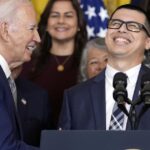Dennis Hayes had been posting his outrage toward the federal government on Facebook without so much as a like when he was contacted by an unfamiliar group suggesting the 70-year-old retired handyman run for the U.S. House.
Patriots Run Project, a furtive recruiter of hardcore conservative third-party candidates, indicated it would help if Hayes were willing to run.
“They asked me if they got somebody to pay for my filing fee, would I run? And I said yeah. I’m retired, I couldn’t pay the fee,” Hayes explained last week after news broke that the recruiter wasn’t the grassroots organization it claimed to be.
The filing fee was $1,740.
Hayes is now the Libertarian candidate for Montana’s western U.S. House district. He defeated Libertarian rival Ernie Noble 390 votes to 206 in the June 5 primary election. The western House district runs from Bozeman to Eureka and drew more than 150,458 voters, mostly for incumbent U.S. Rep. Ryan Zinke and Democratic challenger Monica Tranel.
“They asked me if they got somebody to pay for my filing fee, would I run? And I said yeah. I’m retired, I couldn’t pay the fee.”
Dennis Hayes
The nonprofit Institute for Strategic Dialogue, which watchdogs internet disinformation, reported June 13 that the Patriots Run Project was running a network of groups, websites and Facebook pages that skirted the social media site’s ad transparency policies. Politico first broke the story.
The ISD report focused not on Hayes, but rather on PRP’s lack of transparency, which Facebook parent company Meta allowed for more than a year, despite Meta disclosure policies designed to protect customers from disinformation. More than 30% of U.S. adults reported regularly getting news from Facebook in 2023, according to the Pew Research Center, a nonpartisan think tank.
Because PRP disclosed nothing of its spending aside from a few broadly rounded details reported in Meta’s ad library, there’s no accounting for how successful it may have been in recruiting candidates. That lack of disclosure, coupled with federal election law exempting candidates who raise or spend less than $5,000 from reporting donors or expenditures, kept the public in the dark about PRP’s activities.
The disclosure exception is Hayes, who volunteered that the Patriots Run Project was the motivation for his candidacy. The reveal came during an interview with Montana Public Radio. The Institute for Strategic Dialogue cited that interview, published May 15, as confirmation of Hayes’ recruitment.
The Patriots Run Project website describes the group’s purpose as recruiting candidates who met a needle-threading criteria: prospects must be both pro-Trump and opposed to America’s two-party system. Within 12 weeks of Hayes’ campaign registration, Libertarians booed Trump loudly at their convention for his 2020 handling of COVID-19 and the $8.4 trillion, plus interest, that was added to the national debt during Trump’s presidency.
PRP ads that targeted Montana aimed to recruit candidates who were “tired of the uniparty” — a reference to a populist conspiracy theory that Republicans and Democrats have collaborated to create a single organization that controls the federal government regardless of which party is elected to leadership. U.S. Rep. Matt Rosendale, the Republican lawmaker representing Helena, Billings, and all points east, professes concern about the uniparty regularly.





